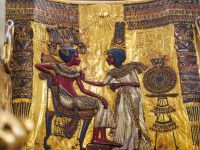The decision by Egypt to recall its ambassador to Israel in protest at the deaths of five Egyptian policemen shot by Israeli forces is what happens after the ouster of a leader who is too frightened to rock the boat. Had Hosni Mubarak still been president, Thursday's shootout between Israeli soldiers and Palestinian activists who had launched an attack on Israel reportedly from Egyptian soil, would have been met with a much less stronger reaction — perhaps a summoning for consultation, and may be not even that. Mubarak wanted to be on such good terms with Israel, as well as with America — Israel's No. 1 ally — that more than likely he would have turned a blind eye and lent a deaf ear to the entire incident.
But that was then. The new rulers of Egypt will not sweep the matter under the rug. Egypt's interim government accused Israel of violating the 1979 peace treaty and said the envoy would be withdrawn until Israel concludes its investigation into the Egyptian security forces' deaths. It was the first time in nearly 11 years that Egypt decided to recall its ambassador from Israel, the last time being in November 2000 when the Egyptians protested the excessive use of violence against Palestinians during the second uprising.
According to reports, Israeli forces killed the Egyptian officers in a cross-fire on Thursday while chasing suspected Palestinian activists who attacked buses near the Israeli Red Sea resort of Eilat in a roadside ambush, killing eight people. Egyptian officials say Israeli forces chased the suspects across the border, and a number of people were killed, including the policemen.
Israel has promised to investigate the deaths, the announcement coming after the Egyptian Cabinet, in a strongly worded statement, held Israel “politically and legally responsible for this incident,” saying lax security on its side allowed the shootings to take place.
It is hard to imagine the ties being severed. Egypt's new leaders have asserted their commitment to the landmark peace treaty with Israel. But at the same time, Israel should understand that Egypt without Mubarak will not be as passive when it comes to ties with the Jewish state, as attested by angry protesters outside the Israeli Embassy in Cairo calling for the embassy to be closed and the ambassador expelled. They burned the Israeli flag and tore down the metal barriers at the entrance of the embassy, scenes that could only have been witnessed in the post-Mubarak era. Egypt's new leaders are obviously being more responsive to public opinion about Tel Aviv, which remains overwhelmingly unpopular because of its conflict with the Palestinians.
The decision to recall the ambassador is a stern test of the relationship between Egypt and Israel who have fought four wars. And more ordeals could follow. There could be more such attacks between Palestinians and Israelis. Israel's border with Egypt is 200 kilometers of mountainous desert with no fence for most of its length.
The ambush also has threatened to stoke the Mideast conflict as retaliatory violence between Israel and Palestinians spiked. Israeli airstrikes killed at least 12 Palestinians on Friday in Gaza, and nine Israelis were wounded by Palestinian rockets fired into southern Israel.
The political upheaval in Egypt has heightened tension with Israel which, in turn, should not maintain positions and attitudes as if Mubarak were still president.








